Every time the dishwasher runs, the dishes should come out clean and shiny. Nothing is worse than opening your dishwasher after the cycle is done and finding that your plates and cutlery are still dirty from last night’s meal.
When this happens, people often think that the dishwasher isn’t doing an excellent job cleaning. Many people don’t know that detergent is the real problem. This is a much easier problem to fix than buying a new dishwasher. Switching your current cleaner for a new one can make a huge difference in how clean your dishes are.
When looking for the best dishwashing detergent, you’ll see right away that you have a lot of choices.
What Is Dishwasher Detergent?
A detergent is essentially a type of soap. Dishwashing detergents are good at getting dried food off the glass and baked-on food off pots, and they also keep dishes from getting stained.
A concentrated dishwasher detergent should get rid of all stains. Also, you want the best powder or liquid dishwashing soap to do the job. There are many different kinds of dish soap, such as gels, powders, tablets, and pods. So how do you choose the best dishwashing detergent for you?
The best cleaning agent cleans dishes, leaves the smallest amount of cleaner on surfaces after rinsing, has flexibility in cleaning various dish surfaces and stains, is simple to use, and gives the best value for the price per gram of powder. In addition, the dishwashing detergent should not foam too much because this could cause leaks in the dishwasher.
How to Pick the Best Detergent for Hard Water
Hard water can make it difficult for dishwasher detergents to clean dishes well, leaving chalky residue, cloudiness, and hard water spots. Dishwasher detergents made for hard water are made to stop this reaction, so they clean better. When picking the best dishwasher detergent for hard water, you should consider the type of detergent, its ingredients, how it smells, and how friendly it is to the environment. Read on to find out more.
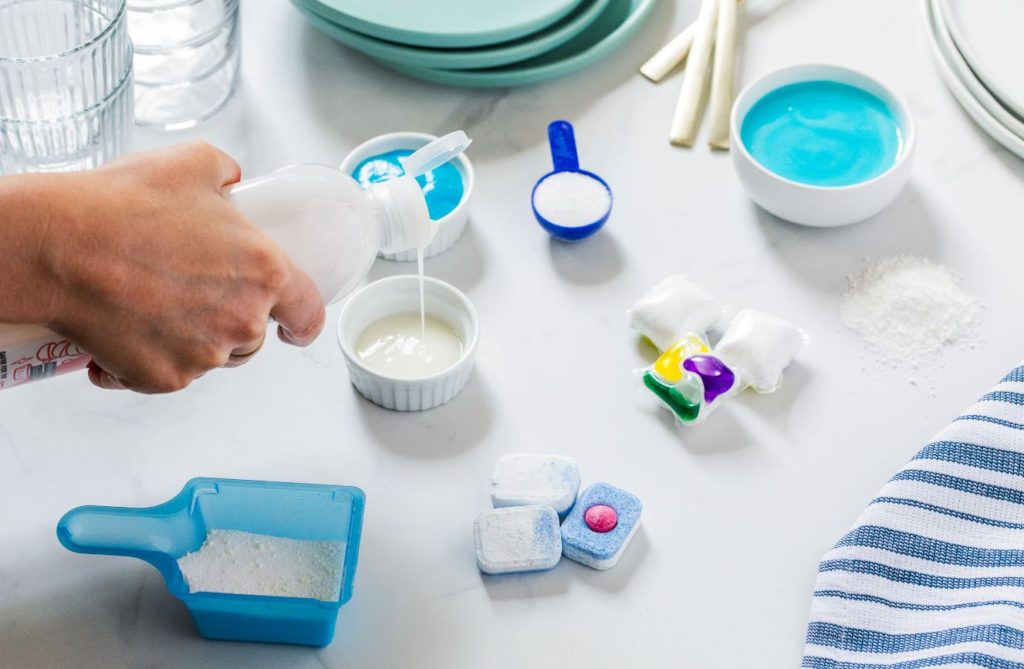
Type
There are different kinds of dishwasher detergent for hard water, such as gels, powders, single-load pods, and tablets.
- Gel detergents are cheaper yet tend not to clean as well. Gel detergents can clean dishes but often don’t include bleaching agents and enzymes. Gels dissolve quickly and are less abrasive for washing delicate dishes. When measuring or storing liquid, they can create a mess.
- Powdered detergents are another cheap option that can clean well because they contain bleaching agents and enzymes. Most of the time, they work better than gels at cleaning dishes. Powders can be hard to measure and store, so keep that in mind. They can also clump up over time in damp places or when they get wet (outside of the dishwasher, of course). But because powders aren’t already measured, they are an excellent choice for homes with hard water, where more detergent is often needed.
- Single-dose dishwasher pills/pods include tablets and gel packs where measurements and spills are eliminated. These easy-to-store cleansers are deep-cleaning, and while they can be expensive, they are pretty user-friendly.
Ingredients
Since detergents and soaps can react with hard water to leave a chalky or slimy film on surfaces, it’s harder to clean dishes, glasses, and silverware completely. The best dishwasher detergent for hard water contains sodium, citric acid, and enzymes, which make the water in the dishwasher softer and break up hard water deposits so that the dishes get a better clean.
No matter which dishwashing cleaner you choose, its main job is to clean your dishes as thoroughly as possible. The best dish detergents have similar ingredients that make this possible. Here are some of the most common ingredients in detergents and what they are used for:
- Phosphates keep calcium and magnesium from sticking together and forming limescale. Since phosphates can hurt the environment, many eco-friendly detergents are starting to be made without them.
- Alkaline salts are used in traditional powdered detergents. Alkaline salts cut through grease and break it up so it can be washed away. Alkali metal hydroxides and sodium carbonate are two of the most common types of salt.
- Non-ionic surfactants break down fats, oils, and other substances on the lips and stop spots from forming while the lips are drying.
- Enzymes make it easier to wash away food deposits by breaking them down into smaller pieces. Proteins, fats, starches, and cellulose are all broken down by enzymes.
- Softening water is done with sodium-based ingredients like sodium carbonate and sodium citrate. Calcium and magnesium ions, which leave behind residues in hard water, react with sodium ions and are replaced by them. This reaction makes detergents work better in hard water and make it less likely that dishes will get dirty.
- Citric acid binds to minerals, which makes hard water soften on its own. It also helps detergents clean dishes better because it is a ‘chelating’ agent– that is, the process of removing metals.
Some dishwashing detergents also have perfumes, anti-clumping agents, gelling agents, and anti-foaming agents. If you use a detergent that doesn’t have any of these things, your dishes will still be full of food, water spots, and many kinds of bacteria.
Because of this, it is essential to look at the ingredients of any potential dishwashing detergents.
Eco-Friendliness
Dishwasher detergents that are better for the environment and people are called “eco-friendly.” Some of the ingredients in these detergents are biodegradable, natural, or from plants. They offer a thorough clean while having less of an effect on the environment by using enzymes, acids, and fragrances that come from nature.
Instead of phosphates, many dishwasher detergents use something called an enzyme. Phosphates used to be more common in detergents to help break down food, but several U.S. states have banned them because they can hurt ecosystems. People who care about the environment should choose detergents that don’t contain phosphates. But some people find that detergents without phosphates don’t work as well, so they may still choose detergents with phosphates.
Dishwasher detergent pods and pills are frequently the most compact and concentrated solution. Recyclable cardboard packaging for pods or tablets reduces their environmental impact.
Studies keep showing how important it is to choose a detergent without chemicals that are bad for the environment. If you want a detergent that is as good for the environment as possible, look for one that doesn’t have these toxic ingredients:
- Phosphates
- Triclosan
- Sodium lauryl sulfate (SLS)
- Diethanolamine
- Chlorine
- Ammonia
- Formaldehyde
Forms Of Dishwasher Cleaning Agents
The most common dishwashing detergents are gels (or liquid detergents), powders, and single-dose units like packs, tablets, or pods. We will explore each more thoroughly below.
Gel Or Liquid Detergents
Many people think that gel dishwashing detergent is the same as the stuff you would use to wash dishes by hand. Even though it looks and feels the same, it is not.
If you use dishwashing liquid to wash dishes by hand, you shouldn’t use it in a dishwashing machine. Instead, you should use dishwashing liquid that is made for machines.
Liquid detergent is easier to use than powder detergent because it goes straight into the dishwasher dispenser. The gel comes in a bottle that is easy to hold and from which the liquid can be poured smoothly without spilling.
Since water is the first liquid ingredient, they are less rough than powders. The main problem with liquids is that they cost a little more.
Powder Detergents
People have called powder detergents “the poor man’s dishwashing agent” because they are the least expensive of the three types of detergents. But don’t be fooled by this name. Powder detergents can work just as well as gel detergents.
With a powder detergent, just use the scooper to measure the right amount of powder. Put the powder in the part of the dishwasher that holds the detergent, and then start the cycle.
The best thing about powder detergent is that it’s cheap, and a big powder box will last long. Even though it might be too rough for fine tableware like glasses, you might want to try it on pots and pans to eliminate burnt-on stains.
Single-Dose Detergents
In the past few years, pods, tablets, and packets that only need to be used once have become popular. Pods for washing dishes look like small bricks and have concentrated dishwashing powder inside. They can also come in a pod and be made of gel instead of powder.
No matter what kind of single-dose unit you choose, the point is to have your dishwashing detergent already separated into a single dose. These are the easiest to use because you don’t have to measure anything. Put a pod or tablet into the dishwasher’s chamber for detergent.
Each unit’s detergent is the perfect amount, neither too much nor too little. You’ll see a small, usually red ball in the middle of a tablet. This rinse aid ensures no detergent is left on the dishes after each cycle, leaving the dishes sparkling clean.
The biggest problem with single-unit detergent is that it is the most expensive way to clean dishes.
More Factors to Consider
Water Supply
When choosing a suitable dishwashing soap, you should also consider whether the water in your home is hard or soft. Consumer Reports say that hard water can make it difficult to clean your dishes:
“Hard water has at least 7 grains per gallon (121 milligrams per liter) or more of calcium, magnesium, and other minerals. Hard water can cause spots and crusty buildup on the heating element, making it harder for your dishwasher to clean.
Choose a detergent that works well with hard water as one way to fix this problem. Putting rinse aid in the wash cycle could also make a big difference.
Packaging
This is an essential thing to think about if you want to make better choices for the environment. Using pods or individually wrapped tablets might not seem the most eco-friendly thing. But some companies that make detergents are doing more to make their products better for the environment.
Convenience
This is important. Single-dose pods were made to make washing dishes as easy as possible. Liquid or powder detergents take time and might be imprecise.
With a pod, you always get the proper dose, and this makes things easier overall and saves time because you don’t have to measure yourself. So, if your primary concern is the ease of use, the single-dose pod or tablet is your best option.
Cutting Power
How well your detergent cuts through grease, oil, and fat is called its “cutting power.” There’s no point in using a dishwasher if the detergent doesn’t get the dishes clean. A knife’s cutting ability depends on its molecular composition and assembly.
The detergent acts as a ‘surfactant,’ a compound that lowers the surface tension between two substances. In other words, the soap connects to the water, and gravity and friction pull the molecules of soap, grease, and water away from the item.
Scent/Fragrance
Do you have a favorite smell for your dishwashing detergent? This isn’t as much of a problem as it would be with laundry detergent since the smell won’t stick to the dishes after they come out of the dishwasher. As with most cleaning products, dishwasher detergents come in various scents from either chemicals or the environment. Since the smell doesn’t stay on the dishes, this isn’t as important to many people.
Still, some people who use dishwashers love the smell of flowers from the liquid or powder they use to clean the dishes. Try to buy a cleaner that doesn’t have any fragrances or perfumes in it. These things aren’t necessary and won’t make your dishes cleaner.
The smell of many dishwasher detergents is clean and fresh. Some detergents made from natural ingredients use essential oil scents instead of chemical scents, and some alternatives are odorless. These detergents are suitable for scent-sensitive or allergy-prone people and those who prefer simple ingredient lists.
Price
Dishes must be washed; you can count on doing that almost daily. It’s essential to consider the cost and cost per load, and this is easy to figure out for pods that have already been measured, but it’s a little harder for liquids and powders.
The least expensive way to wash dishes tends to be with powder, followed by liquid detergent, and then with single-use units.
Ingredients That You’ll Want To Avoid
I’ve already said a little bit about this, but there are a few more things you should try to avoid when choosing a detergent. These things might help the washing process, but they are usually worse for your health and the environment than for you.
Phthalates
Phthalates are found in many household and personal items, like plastics, detergents, and cosmetics. Most of the time, these chemicals soften plastic to make it more bendable. In detergents, however, are used to create an artificial scent.
Phthalates have been linked to health problems like hormone imbalances, cancer, and problems getting pregnant or having children.
Polyacrylates
Polyacrylates can be found in commercial and household dishwashing detergents. They work by binding together substances dissolved in water, making it possible for detergent surfactants (wetting agents) to do their jobs.
But if not handled correctly, polyacrylates can be harmful. Even though many sources say it’s not dangerous, it can irritate your eyes or skin, make you very sick, and if you ingest a lot of it, it can even kill you. If you have small children running around the house, you should avoid anything with polyacrylates.
Methylisothiazolinone
Methylisothiazolinone keeps cleaning products fresh. You should avoid detergents with methylisothiazolinone because it’s corrosive and hazardous for your eyes and skin.
It also has terrible environmental effects and hurts marine life when it gets into the water.
Benzisothiazolinone
This common ingredient in detergents is used with the chemical methylisothiazolinone noted above. Its job is to make products like fabric softeners and stainless steel cleaners last longer.
Like methylisothiazolinone, it can cause severe eye and skin irritation and hurt aquatic life.
Sodium Hypochlorite
Sodium hypochlorite is used to clean and disinfect water and is often used to bleach, eliminate smells, and clean surfaces. It is often used to clean swimming pools in addition to dish detergents. Sodium Hypochlorite might be helpful, but the possible side effects are worse than the benefits.
It can irritate the skin, eyes, and throat when breathed in.
Dyes
Many detergent companies add dyes to their products to make the colors brighter and more vivid. Dyes in cleaning products are often not labeled on the ingredient lists but are usually made up of several different chemicals, some known carcinogens.
Several types of cancer, especially breast cancer in women, have been linked to them.
Hard Water
Hard Water And Residue
Hard water has a lot of minerals in it, which leave a film on surfaces and appliances. Minerals in hard water can also leave a film on clean dishes, making them look chalky and making glasses look cloudy.
The leading cause of residue on dishes is hard water, especially if you aren’t using suitable dish soap. If you have problems with hard water, the first thing you should look for in a detergent is something that softens the water.
Use a hard water dishwasher detergent to restore hard-water-damaged dishes. The most effective hard water dishwasher detergents soften water and remove deposits, leaving dishes clean and shining.
The best hard-water dishwasher detergents can soften the water to make up for the fact that your water is hard. The chemicals that help soften the water are based on sodium because water softeners create a reaction where calcium and magnesium ions in hard water swap with sodium ions to reduce the buildup that stays on your dishes.
Using a good rinse aid product as part of your regular dishwashing routine can also help reduce residue and water spots.
i am 22 years old and i tried to run a dishwasher for the first time and i have now learned that dishwasher detergent and dish soap are two different things pic.twitter.com/5S1U7tDhr0
— gabs ଘ(੭*ˊᵕˋ)੭* ̀ˋ* ੈ✩‧₊˚ (@gabbyygh0ul) June 19, 2021
How Does Hard Water Affect Dishwashers?
- Chalky Deposits In Your Dishwasher:
If your dishwasher has deposits, it might be more dangerous than it looks. The residue will clog up movable parts and cause the dishwasher to stop working. Residue can also cause extensive and irreversible damage to your dishwasher. In addition, a dishwasher that doesn’t work doesn’t clean dishes well.
- Water Spots:
Water spots might look annoying on your glassware, but they are increasingly damaging to dishwashers and dishes. Spotless dishes should be what you end up with after thoroughly rinsing your dishes. In many instances, they form quickly and become permanently imprinted on your dishwasher within minutes.
- Signs Of Rust:
Some mineral deposits in hard water are salts, which speed up the rusting process. We all know a rusty dishwasher soon grinds to a stop. Corrosion will occur as quickly as hard water begins flowing through your dishwasher, and it might take you some months to notice.
Hard water might cause dishes to come out of the dishwasher still dirty. Hard water affects detergent efficiency, and limescale causes dishwasher blockages. If your dishwasher leaves dishes dirty, it’s time to clear the buildup and choose a hard water detergent.
How To Remedy Stained Dishwashers
There are ways you can remedy limescale buildup, from dissolving to disintegrating to melting it all away. You can fix stains with simple household ingredients to commercial and store-bought ingredients. Here are simple ways you can clean stained dishwashers.
- Rinse Aid: Firstly, if your dishwasher has a rinse aid dispenser, fill it up and keep it filled up regularly. Additional rinse aid will help water to rinse off of your dishes and glasses. It does this by slowly decreasing the surface tension of water. This means it sticks to surfaces less efficiently and can drain and evaporate away without leaving spots or residue.
- Hard Water Detergent: Most liquid detergents are better than powder detergents because their active ingredients can stand up to hard water. In either case, suitable detergents for washing with hard water have extra ingredients that soften the water so that the rest of the detergent can get rid of the toughest stains. This also makes it easier for soaps to become foamy.
- Vinegar Rinse: Vinegar can also condition and soften the water. It lowers the water’s pH, making the minerals, such as magnesium and calcium, more soluble in water. You can pour a cup into the dispenser during a dishwasher cycle and watch it work wonders. Furthermore, vinegar is eco-friendly compared to other dishwasher detergents and has no harsh chemicals.
- Water Softener: A water softener dilutes hard water’s minerals to soften it. Dishwasher detergents function similarly. A water softener enhances your dishwasher’s cleaning power. During every wash cycle, resin particles in the water softener exchange calcium and magnesium for sodium or potassium.
- DIY Remedies: Homemade dishwasher detergents are simple. Mixing washing soda, borax, and kosher salt makes the best dishwasher detergent for hard water. All you need is 1 tablespoon of the mixture.
Ok if you need dishwasher detergent and are all out! It works I did it last night, 3 drops of dish soap in the compartment and fill the rest with baking soda! Pow pic.twitter.com/2CQHDmnxBz
— Juliette (@DateJulieB) July 11, 2022
Other Dishwashing Products
- Dishwasher Cleaner
Clean your dishwasher if you want it to work as well as possible. Who knew that you had to clean the thing that cleans your dishes? It can make a huge difference in how well the machine works overall. A dishwasher cleaner cleans the inside of the device, making it work as well as when it was first bought.
- Rinse Aids
Rinse Aid doesn’t eliminate dirt and gunk from your dishes, but it is still essential to every wash cycle. Rinse Aid doesn’t help with the rinsing process, oddly enough, but does help with the drying process. During the drying cycle, it helps pull water out of the dishes so that water spots don’t form.
It has chemicals called surfactants that work to lower the surface tension of water. This means that the water doesn’t form droplets on your dishes; instead, it just rolls off without forming droplets and leaving those spots. Many tablets and detergent pods already have Rinse Aid, so you don’t have to add them separately.
- Fresheners
You need to do the same things to keep your dishwasher clean as you do to keep your garbage disposal clean. Small pieces of food can get stuck in the machine’s filter and other cracks. Over time, these pieces of food start to rot, which will not only make the machine smell bad but could also attract pests.
Dishwashing Best Practices & Tips
You now know how to choose a suitable detergent for your dishwasher, but there are other things you could do to ensure your dishwasher works well. These tips will not only keep your dishes sparkling clean, but they will also help your dishwasher last longer.
- Load the dishwasher well, but don’t try to put too much in it. A dishwasher that is too full can leave dishes dirty.
- Join the club of people who always clean their plates or at least scrape off food scraps before loading. This keeps food from getting stuck in the filter of the dishwasher.
- For older dishwashers (machines, that is), rinse the dishes before putting them in. Older dishwashers aren’t as powerful as newer ones.
- Add a Rinse Aid agent to help the drying cycle and prevent water spots if you don’t already have one.
- Always put fragile things on the top rack and larger items on the bottom.
- Mix up your basket of silverware. Don’t put spoons with spoons and forks with forks. Mixing them up makes them more visible, so they can be cleaned better.
Environmental Impact Of Dishwashing Detergents
Many things we do and our daily choices significantly affect the environment. For example, the dish detergent we choose to use impacts the environment.
Some detergents on the market say they are “eco-friendly,” but it’s up to you to find out the truth. Even if a company says its product doesn’t hurt the environment, that doesn’t mean it’s true. There are many things to think about when buying dish soap, especially if you want one that is good for the environment.
First, it’s crucial to think about the packaging. Is each pod of detergent in its own piece of plastic?
Next, you need to look at what goes into the recipe. Does the detergent have phosphates, which harm aquatic animals when they enter freshwater?
If you have a septic system, it’s even more important to consider the detergent you choose. Only biodegradable items work well in a septic tank, and it’s vital to have good bacteria in the septic system so that waste can be broken down properly.
A phosphate-based detergent can damage a septic system because it kills the good bacteria needed for the system to work.
Our Picks
Alright, enough talk about general guidelines. Here are the detergents we think are best.
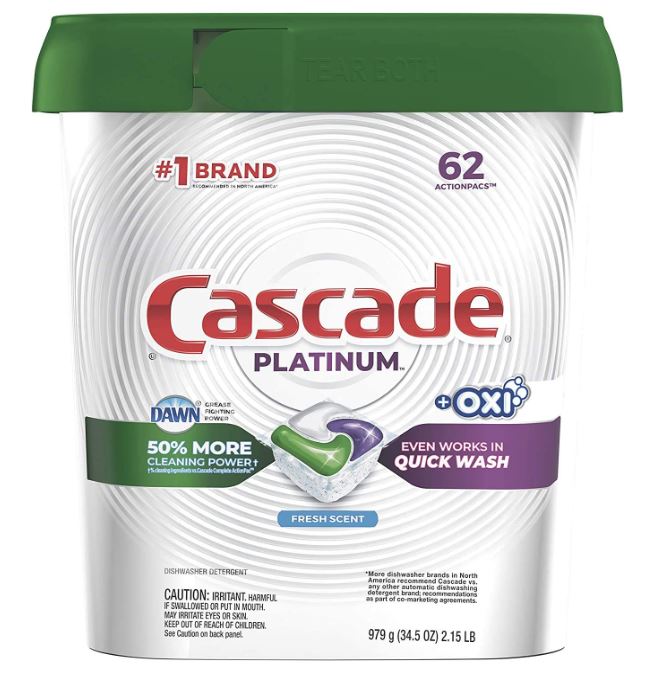
Cascade Platinum ActionPacs
Cascade Platinum ActionPac is the best detergent for ease, and these pods cut through oil and wash away 24-hour-old filth. These concentrated packets are 6x more effective than National cheap capsules, and one super-sized container cleans 62 loads.
Cascade is North America’s most trusted dish detergent, having gained the Good Housekeeping mark. Close the dishwasher dispenser chamber after adding a detergent pod. There’s no measurement, and the pods aren’t separately wrapped, so you won’t waste time opening them.
Because of its power, there’s no need for a pre-wash, saving money and fostering eco-friendly practices. Although beneficial for the environment, there was concern that the lack of phosphate may impede detergent cleaning. You can trust Cascade and not worry about dangerous phosphates.
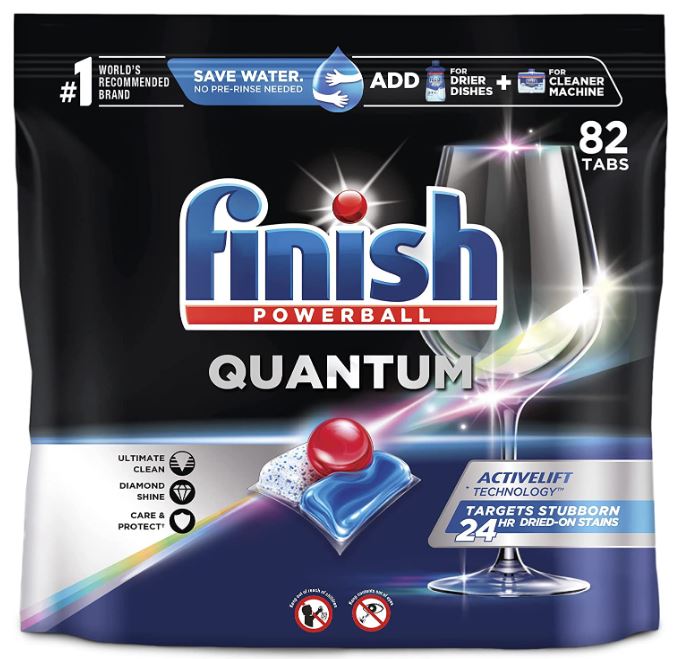
Finish Quantum Dishwasher Tablets
Finish’s detergent tablet is another convenient and easy-to-use dishwashing option, especially for septic systems. The Powerball in these tablets activates three dishwashing ingredients when each cycle is ready. This detergent tablet removes baked-on lasagna, dried oatmeal, and burnt scrambled eggs.
Each Quantum Max Powerball tablet dissolves messes and cuts grease. This cleans dishes, glasses, and silverware. Powerball tablets clean without pre-washing.
Some reviewers have noted the lack of cleaning power compared to Cascade ActionPacs. Finish pills generally tackle the toughest messes the first time.
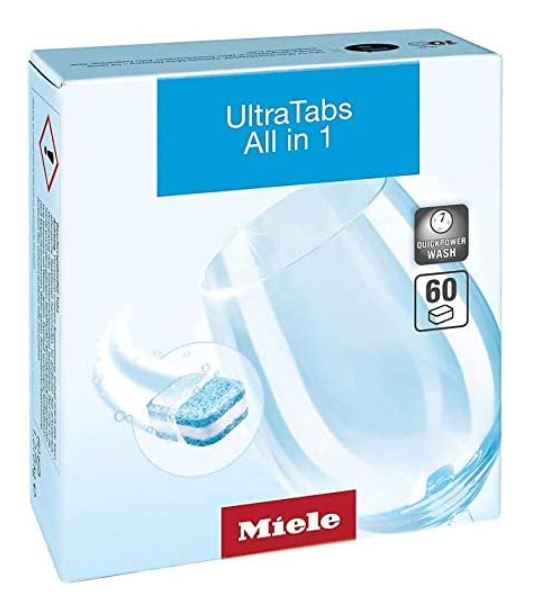
Miele
Miele isn’t as well-known as Cascade or Finish, but don’t underestimate it. Miele dishwasher tablets include stain and grease-fighting enzymes. Though designed primarily for Miele dishwashers, it may be used in any tablet-compatible dishwasher.
A tablet has a plastic coating when removed from the package, and the packaging dissolves while the dishwasher runs, releasing the detergent.
Some reviewers noted that dirty plates require two tablets. Some reviewers think 12 pills is effective; therefore, it depends on water quality and dishwasher efficiency.
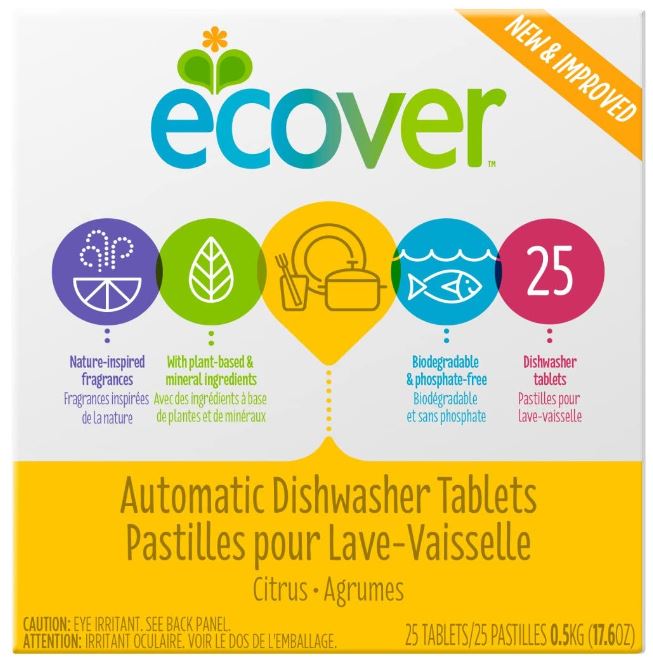
Ecover Automatic
These tablets clean without creating residue or using strong chemicals, and sodium carbonate and enzymes cut through food waste and hard water. This non-animal-tested product comes in recycled cardboard to reduce waste and 25 dishwashing tablets per package.
The plant-based and mineral-based tablets are biodegradable and phosphate-free to reduce their environmental impact.
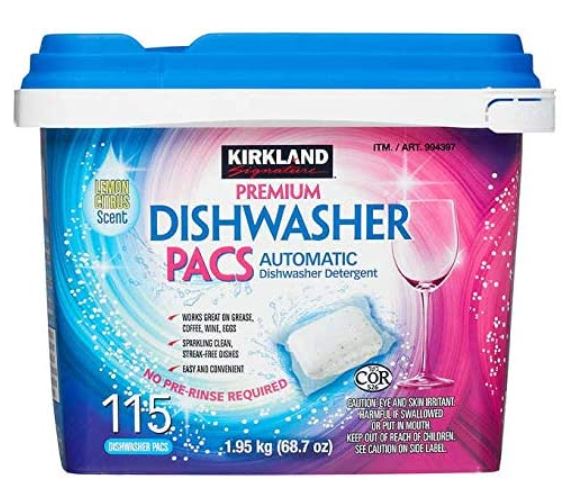
Kirkland Signature
Kirkland Signature Automatic Dishwasher Detergent Pacs are cost-effective. 115 dishwashing ‘pacs’ (or pods) are the most cost-effective product on our list.
Each small pod is more potent than it looks, leaving dishes and utensils streak-free. They’re straightforward to use and remove oil and stubborn stains effectively. Kirkland’s new mix makes these pacs eco-friendly without sacrificing washing power.
This eco-friendly Kirkland detergent requires no pre-rinse. And each load costs 11 cents. If you have a sensitive nose or don’t like citrus, choose a fragrance-free detergent instead.
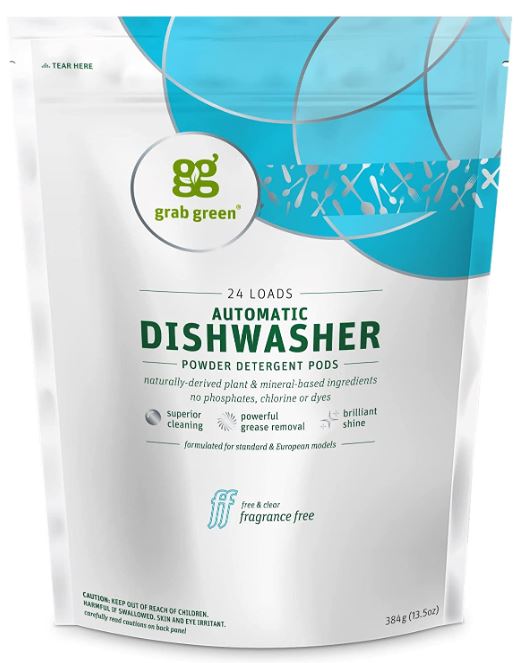
Grab Green Natural
Grab Green‘s fragrance, dye, phosphate, paraben, and chlorine-free dishwasher detergent is eco-friendly. The natural recipe is caustic-free and cleans dishes with plant- and mineral-based substances.
Sodium carbonate and enzymes remove grease and food residue. The package lists the ingredients so people know what’s on their plates and in their pipes.
This animal-friendly detergent fits many washes in a tiny package. Each pouch provides up to 80 cleaning loads with a Velcro-closure scoop.
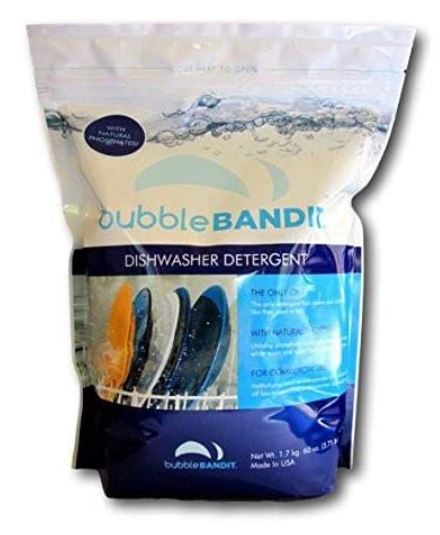
Bubble Bandit
Bubble Bandit’s dishwasher detergent with phosphate cleans extra-deep. Several states have prohibited phosphate but continue to allow home and commercial use. This dishwasher detergent contains phosphate for effective cleaning.
Sodium and phosphate make the mixture hard-water safe. Remove watermarks, white film, and limescale. 60 septic-safe, perfume- and dye-free dishwasher cycles per bag.
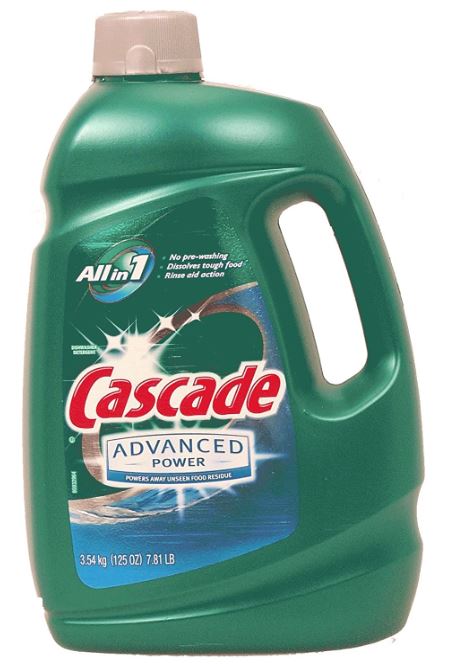
Cascade Advanced Power
Some choose Advanced Power Liquid because it’s a liquid rather than a single-dose packet detergent. This liquid detergent, like the pods, has Dawn’s shine-boosting power for streak-free dishes, and it can destroy 24-hour-old food.
Depending on how often and how much you wash dishes, this bottle can last 6 months.
Using this detergent with low-quality washing machines has drawn criticism. One reviewer states this works fine in high-quality machines, but Cascade pods perform better in low-quality machines.
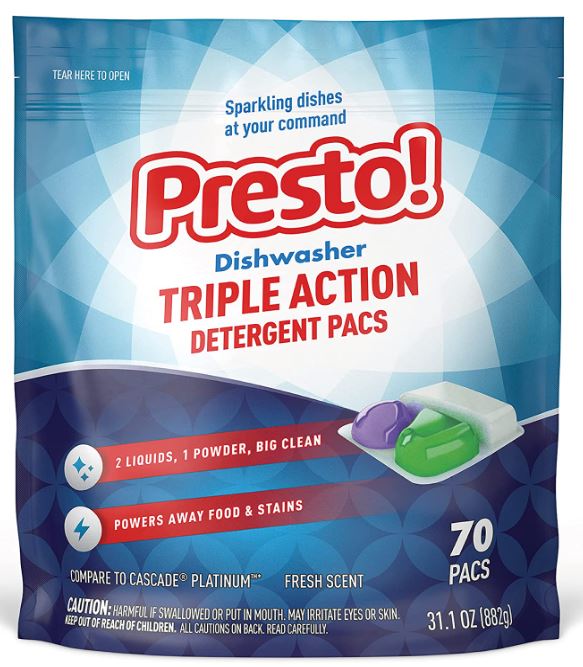
Presto Triple Action Dishwasher Packs
This dishwashing detergent for hard water has a refreshing scent and is tough on coffee and tea stains. It includes no caustic chemicals and is suitable for hard water, and a dishwasher’s load determines the detergent amount.
It’s mild on dishes and preserves their appearance. Sodium carbonate dissolves hard water particles, like other dishwasher detergents. Phosphates and chlorine-free, and it’s safe for dishes and dishwashers.
Bonus: anti-spotting rinse helps. You won’t have to scrub your plates after every rinse cycle to remove yellowish watermarks. Overdosing on this dishwasher detergent will make the bottom sticky and won’t dissolve.
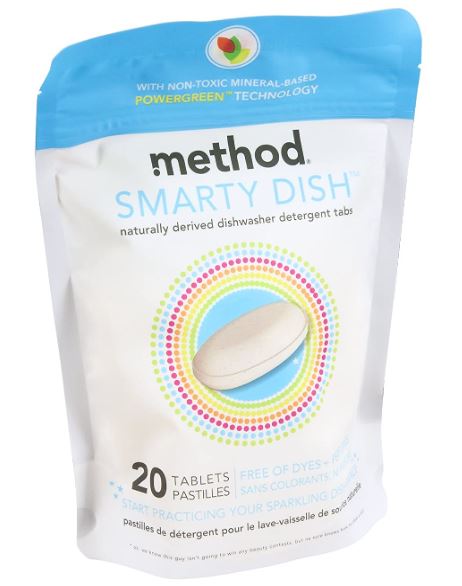
Method Smarty Dish Detergent Packs
Eco-friendly detergent is preferable. Mineral and plant-based ingredients clean this dishwasher works on hard water and removes 48-hour-old food from dishes. It’s cruelty-free and animal-tested.
One Method Smarty resealable packet contains 45 dishwasher soap packs. Fully-prepared dishwasher detergent, phosphates, chlorine bleach, and other hazardous compounds are absent.
This dishwasher detergent softens hard water, making your dishwasher happy. It leaves no sticky residue on kitchenware. After using Smarty, your plates will be unscented, immaculate, and shining. Food particles drop by 95%.
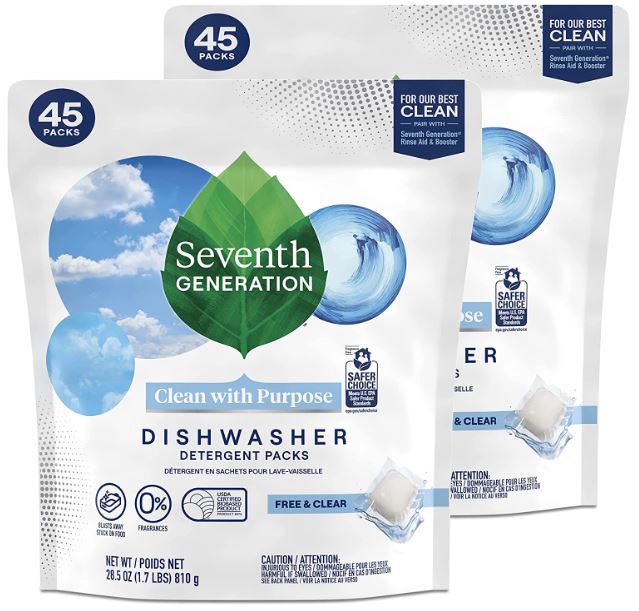
Seventh Generation Dishwasher Detergent
Seventh Generation packets clean nicely and leave dishes streak-free. No pre-rinse is necessary, and the detergent is eco-friendly.
Plant-based detergent with less harmful components. It replaces powders and gels, and it’s safe for 25 years. Plenty of detergent cleans and shines plates. Safe for children’s dishes and water bottles.
Don’t unwrap or puncture dishwasher packs before loading. You now have the most incredible hard water dishwasher detergent, and this USDA-certified product is phosphate- and chlorine-free. Don’t touch the pods with bare hands.
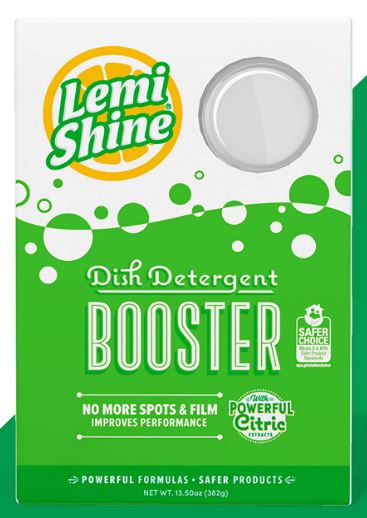
Lemi Shine Natural Dishwasher Pods
Lemi Shine dishwasher detergent‘s citric acid composition cuts through hard water problems. Dual-chamber detergent pods contain powder and gel. Effective ingredients cut fat and stuck-on food for cleaner dishes. Sodium carbonate and citric acid help this detergent clean and shine plates.
Made with biodegradable surfactants and enzymes. The bleach- and phosphate-free solution cleans without harsh chemicals. Each pouch has 65 dishwashing pods.
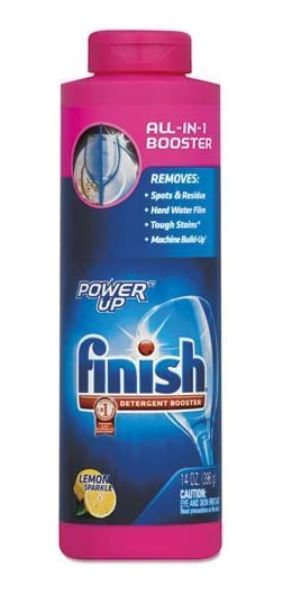
Finish Hard Water Booster Powder
Finish booster powder improves dishwasher hard water performance. This solution removes water spots, filmy residue, and limescale accumulation with a dishwashing detergent and removes bleachable stains like tea and coffee rings. The lemon-scented booster fights odors.
Before every wash, add booster powder. Depending on water hardness, use as needed or every load. This booster works with regular dishwasher detergent to improve hard water cleaning.
People Also Ask (FAQs)
Here are some questions and answers about dishwasher detergents for hard water that are often asked.
- What is pre-rinse?
The pre-rinse also called the “pre-wash,” is the first step in the dishwashing cycle. During this step, the dishes are wetted with a strong stream of warm water. This step doesn’t clean the clothes, but it gets them ready for the primary wash cycle, which comes next.
- Should I use a “rinse aid”?
If the water in your home is hard, then a rinse aid will help you immensely. Hard water makes it more likely to have residue on your dishes, but the rinse aid will help ensure that no water is left behind (meaning no waste).
If you have soft water, you don’t have to use a rinse aid agent, but it could still help your wash cycle, so it’s worth a shot.
- In homes with hard water, which type of dishwasher detergent works best?
The best detergents for washing dishes in hard water have softening agents as part of their list of ingredients. It doesn’t matter what kind of detergent you use, whether it’s a powder, liquid, or pod, as long as it has sodium.
- What happens if I just put regular dish soap in a dishwasher?
It’s never a good idea to do this. Even though both hand washing liquid and machine washing detergent clean dishes, they do not work the same way.
Liquid soap in the washer can cause problems. The dishwasher may overflow with suds, flooding the kitchen, and suds damage the pipes, filter, and drainage system.
- Can I really make my own detergent for the dishwasher?
Yes! It is totally possible to make your own dishwasher detergent at home. If you search Google, you can find a lot of recipes for making your own dish soap.
- How much does a bottle of dishwashing soap usually cost?
How much your dish detergent costs depends on what kind you buy, what brand, and how good the ingredients are. Consumer Reports’ guide to purchasing detergent shows that using a single-dose pod or tablet can cost anywhere from 10 to 39 cents per load.
Powders cost as little as 3 cents per load, while gels and liquids cost between 5 and 11 cents per load.
- Why do pod or tablet detergents cost more than powder or liquid detergents?
There are a few reasons why pods cost more than other snacks. The first is that making pods takes much more work than people think. Unlike loose powder or liquid in a bottle, each pod has to be made from scratch.
The second reason is that the detergent in a pod is much more concentrated than in a traditional gel, which means it has less water. Because of this, you can be sure that each cycle will clean better.
- Which type of dishwasher detergent works best?
The solution depends on your budget, water quality, and environmental concerns. But if you have access, we prefer dishwashing pods.
- Does hard water hurt the dishwasher in any way?
Hard water can build up in the dishwasher, which can make it less effective at cleaning. Using a dishwasher detergent made for hard water and cleaning the dishwasher once in a while can help it work better.
- How much dish soap should I put in the dishwasher?
It’s best to start with the amount suggested by the manufacturer and make changes if the dishes aren’t clean. Homes with soft water may need less detergent, while homes with hard water may need more detergent. Believe it or not, less soap tends to be more effective, as too much soap can lead to soap scum buildup.
- What will happen if you put too much soap in the dishwasher?
Using too much detergent will make too many suds, leave residue on the dishes, and cause buildup in the dishwasher, making the plates less clean.
Conclusion – Bottom Line
Dishwasher detergents were made to make things easier, but that doesn’t mean you can’t choose the one that works best for you. Also, your dishwasher could use a lot of different kinds of detergent, including powder, liquid, gel, and tablet detergents.
Before purchasing the best dishwashing detergent, you must brave a trial and error period. Living in a place with hard water can be difficult for your dishwasher and utensils. However, on the upside, hard water tastes fantastic.
We aim to find you the best products in terms of price and quality, so we expect you to never go back to washing powders and liquids once you’ve tried dishwasher pods or tablets.

